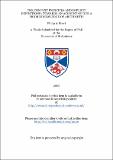Files in this item
The context principle and implicit definitions : towards an account of our a priori knowledge of arithmetic
Item metadata
| dc.contributor.advisor | Wright, Crispin | |
| dc.contributor.author | Ebert, Philip A. | |
| dc.coverage.spatial | 272 p. | en_US |
| dc.date.accessioned | 2018-07-04T12:25:43Z | |
| dc.date.available | 2018-07-04T12:25:43Z | |
| dc.date.issued | 2005 | |
| dc.identifier.uri | https://hdl.handle.net/10023/14916 | |
| dc.description.abstract | This thesis is concerned with explaining how a subject can acquire a priori knowledge of arithmetic. Every account for arithmetical, and in general mathematical knowledge faces Benacerraf's well-known challenge, i.e. how to reconcile the truths of mathematics with what can be known by ordinary human thinkers. I suggest four requirements that jointly make up this challenge and discuss and reject four distinct solutions to it. This will motivate a broadly Fregean approach to our knowledge of arithmetic and mathematics in general. Pursuing this strategy appeals to the context principle which, it is proposed, underwrites a form of Platonism and explains how reference to and object-directed thought about abstract entities is, in principle, possible. I discuss this principle and defend it against different criticisms as put forth in recent literature. Moreover, I will offer a general framework for implicit definitions by means of which - without an appeal to a faculty of intuition or purely pragmatic considerations - a priori and non-inferential knowledge of basic mathematical principles can be acquired. In the course of this discussion, I will argue against various types of opposition to this general approach. Also, I will highlight crucial shortcomings in the explanation of how implicit definitions may underwrite a priori knowledge of basic principles in broadly similar conceptions. In the final part, I will offer a general account of how non-inferential mathematical knowledge resulting from implicit definitions is best conceived which avoids these shortcomings. | en_US |
| dc.language.iso | en | en_US |
| dc.publisher | University of St Andrews | |
| dc.subject.lcc | QA8.4E3 | |
| dc.subject.lcsh | Mathematics--Philosophy | en |
| dc.subject.lcsh | A priori | en |
| dc.title | The context principle and implicit definitions : towards an account of our a priori knowledge of arithmetic | en_US |
| dc.type | Thesis | en_US |
| dc.type.qualificationlevel | Doctoral | en_US |
| dc.type.qualificationname | PhD Doctor of Philosophy | en_US |
| dc.publisher.institution | The University of St Andrews | en_US |
This item appears in the following Collection(s)
Items in the St Andrews Research Repository are protected by copyright, with all rights reserved, unless otherwise indicated.

